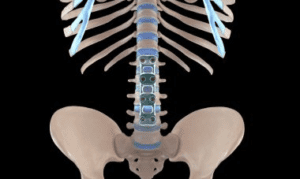In today’s fast-paced world, spinal fusion surgeries are increasingly common. The procedure aims to offer relief to individuals grappling with back pain.
Dr. Gurneet Singh Sawhney, a renowned neurosurgeon in Mumbai explains:
“Spinal fusion involves merging 2 or more vertebrae with bone grafts or synthetic materials. This helps stabilize the spine and reduces pain by preventing movement between the affected vertebrae.”
However, despite advancements in surgical techniques, some patients may still experience back pain post-procedure. This isn’t surprising, as every surgical procedure comes with temporary side effects.
Is It Normal to have Back Pain 6 Months After Spinal Fusion?
 Spinal fusion is a surgical procedure to treat spinal issues. These include degenerative disc disease, spinal fractures, or spinal instability. The surgical procedure aims to improve spinal stability and ease pain. But, some patients express concerns about back pain 6 months after spinal fusion surgery.
Spinal fusion is a surgical procedure to treat spinal issues. These include degenerative disc disease, spinal fractures, or spinal instability. The surgical procedure aims to improve spinal stability and ease pain. But, some patients express concerns about back pain 6 months after spinal fusion surgery.
Is that normal?
According to Dr. Gurneet Singh Sawhney, a certified neurosurgeon in India:
“Every individual’s recovery journey is unique. Some discomfort during the healing process is normal. But, persistent pain at this stage can be troubling. Back pain 6 months after spinal fusion can raise questions for patients. You must not ignore it as it could signal underlying issues demanding attention. It’s very important to understand the cause of back pain that refuses to go away.”
Do you have lingering back pain 6 months after spinal fusion? Please consult a qualified healthcare professional for further evaluation.
Reasons for persistent Back Pain 6 Months After Spinal Fusion

Incomplete Fusion:
Sometimes, the fusion of vertebrae may not fully unite or fuse as intended. This incomplete fusion can lead to instability in the spine, causing persistent pain.
Adjacent Segment Degeneration (ASD):
The vertebrae adjacent to the fused area may experience increased stress and wear over time. This can result in degeneration of these adjacent segments, leading to new or worsening back pain.
Hardware Complications:
During spinal fusion, the surgeon uses hardware such as screws, rods, or plates. They may cause irritation or discomfort if they loosen, break, or shift out of place.
Muscle Weakness and Imbalance:
Following spinal fusion, the muscles supporting the spine may become weakened or imbalanced, causing pain. Muscle weakness occurs due to changes in movement patterns or decreased activity during recovery.
Nerve Compression or Irritation:
Despite successful fusion, nerve compression or irritation may persist or develop over time. This can result from scar tissue formation, spinal stenosis, or other factors. Even slight nerve damage can cause persistent back pain or radiating symptoms into the legs.
Non-Spinal/Surgical Causes:
Back pain after spinal fusion may not always be directly related to the surgery. Other factors can contribute to ongoing discomfort, such as:
- poor posture
- muscle strains
- arthritis
- disc herniation in other spinal levels
Tips to Avoid Back Pain 6 Months after Spinal Fusion
Here are essential tips to help prevent discomfort and maintain spinal health post-operation:
Follow Post-operative Guidelines:
Adhering strictly to the post-operative instructions provided by the neurosurgeon is crucial. This includes proper wound care, activity restrictions, and medication management.

Patients should gradually increase their activity levels as advised by their healthcare provider. Avoid sudden, strenuous activities to prevent strain on the healing spine.
Engage in Regular Exercise:
Participating in a tailored exercise program can strengthen the muscles surrounding the spine and improve spinal stability. Low-impact exercises such as walking, swimming, and gentle stretching can be beneficial.
Avoid Smoking:
Smoking hinders healing and raises post-surgery complication risks. Quit smoking to support ideal healing and decrease the chance of back pain.
Maintain a Healthy Weight:
Excess body weight can exert additional stress on the spine, leading to discomfort and potential complications. Follow a balanced diet and engage in regular physical activity to maintain a healthy weight.
Use Proper Body Mechanics:
Practicing proper body mechanics when performing daily activities can minimize the risk of spine injury. When lifting heavy objects, it is important to use your leg muscles rather than your back to prevent strain.
Stay Hydrated:
Drink plenty of water throughout the day to keep the spinal discs hydrated and functioning optimally.
Manage Stress:

Stress can exacerbate back pain by causing muscle tension and discomfort. Incorporate stress-reduction techniques to promote relaxation and alleviate tension in the back muscles. These include methods like deep breathing, meditation, or yoga.
Please consult a qualified healthcare professional for personalized advice based on your needs and medical history.
Treatment Approaches for Managing Back Pain after Spinal Fusion
Dr. Gurneet Singh Sawhney, an esteemed neurosurgeon in India, highlights:
“Individuals experiencing persistent back pain must consult their healthcare provider. A thorough evaluation, including imaging studies and clinical assessment, can help identify the underlying cause of the pain. Early intervention and targeted management approaches can often alleviate symptoms and improve quality of life.”
Treatment options available for effectively managing back pain following spinal fusion include:

If conservative treatments fail to provide relief, your doctor may consider surgical revision of the spinal fusion. A surgical revision aims to address any underlying issues or complications contributing to persistent back pain.
Physical Therapy:
Engage in targeted exercises and stretches under the guidance of a physical therapist. It can help:
- strengthen the muscles supporting the spine
- improve flexibility
- reduce pain
- enhance mobility
Medications:
To alleviate discomfort and inflammation associated with back pain, your doctor may prescribe:
- nonsteroidal anti-inflammatory drugs (NSAIDs)
- muscle relaxants
- pain relievers

Applying heat or cold packs to the affected area can temporarily relieve discomfort.
Lifestyle Modifications:
Adopting healthy habits can help alleviate back pain and prevent its recurrence. These include:
- maintaining proper posture
- avoiding heavy lifting
- practicing relaxation techniques like yoga or meditation
Injection Therapies:
Your doctor may deliver anti-inflammatory medications like epidural steroid injections or nerve blocks directly to the affected area.

Techniques such as acupuncture, chiropractic care, and massage therapy may offer additional relief from back pain. These alternative therapies promote relaxation, improve circulation, and reduce muscle tension.
Bracing:
In some cases, wearing a supportive brace or corset may help stabilize the spine and ease pressure on the impacted area.
When to consult a doctor?
Dr. Gurneet Singh Sawhney understands the concerns about experiencing back pain 6 months after spinal fusion. Some discomfort during the recovery period is normal. But, persistent pain at this stage warrants attention.
“You must not ignore post-surgery pain beyond 4-6 weeks. Communicate any ongoing symptoms to your healthcare providers. Personalized care and comprehensive assessments are vital to address your concerns and optimize recovery outcomes.”
Are you or a loved one living with pain months after a spinal fusion? Do not delay! Seek medical intervention to explore treatment options and regain comfort and mobility.
Conclusion
Spinal fusion is performed to alleviate pain and stabilize the spine. However, some individuals may still experience discomfort post-operation. Experiencing back pain 6 months after spinal fusion can be particularly distressing. But remember that you are not alone in your journey. You can take proactive steps to manage your pain and improve your quality of life.
Your well-being is paramount. Don’t hesitate to seek the support and guidance you deserve on your path to recovery. With determination and the right approach, relief from back pain is within reach.
Have you got more questions? Let’s head to our FAQ section.
FAQ
How long after spinal fusion does it stop hurting?
Post-operative pain typically diminishes within a few weeks to months. Complete relief may take up to a year or more. It varies by individual factors like surgery extent and health condition.
What should I expect 6 months after spinal fusion?
At 6 months post-surgery, expect reduced acute pain and improved mobility and function. Some residual discomfort or stiffness may persist. But you can address them through ongoing physical therapy and rehabilitation.
What are the different types of back pain after spinal fusion?
The various types of back pain post-spinal fusion include:
- Surgical Site Pain
- Muscular Pain
- Nerve Pain (radiculopathy/neuropathic)
- Adjacent Segment Degeneration
- Failed Back Surgery Syndrome
Please meet a certified neurosurgeon for in-depth evaluation and management.
